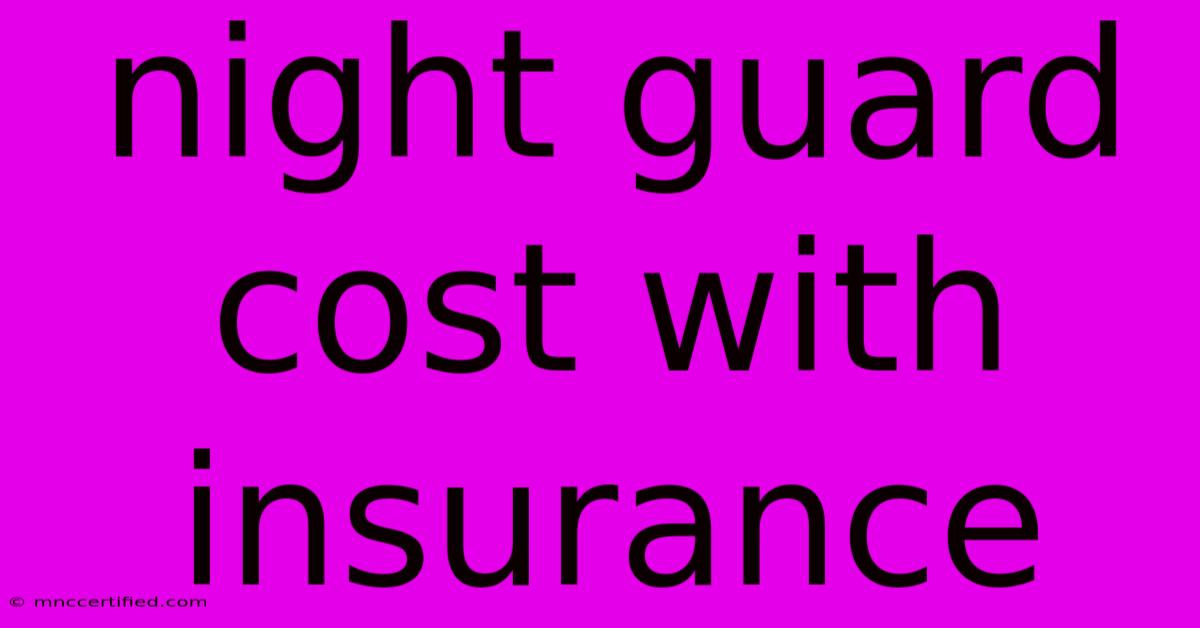Night Guard Cost With Insurance

Table of Contents
Night Guard Cost with Insurance: A Comprehensive Guide
Getting a good night's sleep is crucial for your overall health and well-being. But for millions of people, teeth grinding (bruxism) disrupts their sleep and can lead to serious dental problems. A night guard, also known as a mouthguard or occlusal splint, can provide relief and protect your teeth. However, one of the biggest questions many people have is: how much does a night guard cost with insurance?
This comprehensive guide will break down the costs, insurance coverage options, and ways to save money on your night guard.
Understanding the Cost of a Night Guard
The cost of a night guard varies significantly depending on several factors:
-
Type of Night Guard: The most common types are:
- Stock Night Guards (Boil and Bite): These are the cheapest option, readily available at drugstores. They cost between $10 and $30. However, they often provide a less comfortable and less effective fit compared to custom-made guards.
- Custom-Made Night Guards: Made by a dentist using impressions of your teeth, these offer a superior fit and are more comfortable and effective. This is the most common option recommended by dentists. The cost ranges from $250 to $1000+.
- Sports Mouthguards: While not specifically designed for bruxism, some sports mouthguards can offer basic protection. These are the most inexpensive option.
-
Materials: Night guards are made from different materials, each affecting the cost. Hard acrylic is more durable but might feel less comfortable than softer materials like silicone or thermoplastic.
-
Dentist's Fees: Dentists' fees vary geographically and based on their experience. Costs include the initial consultation, impressions, fabrication of the guard, and any adjustments needed.
Night Guard Coverage with Dental Insurance
Many dental insurance plans offer some level of coverage for night guards, but it's crucial to understand the specifics of your policy.
- Check Your Policy: Contact your insurance provider directly or log into your online portal to review your coverage details. Look for terms like "orthodontics," "prosthodontics," or "occlusal appliances" to see if night guards are included.
- Pre-authorization: Some plans may require pre-authorization before your dentist can begin treatment. This means your dentist needs to obtain approval from your insurance company beforehand.
- Coverage Limits: Even if your plan covers night guards, there will likely be a limit on the amount they will pay. This limit is usually expressed as a percentage of the cost (e.g., 50% or 80%) or a maximum dollar amount.
- Waiting Periods: Your plan may have a waiting period before coverage for certain procedures kicks in. This means you might have to wait a certain number of months after enrolling in the plan before they'll cover a night guard.
Important Note: Insurance companies generally only cover medically necessary night guards, typically those prescribed by a dentist to treat bruxism or temporomandibular joint (TMJ) disorders. If you're purchasing a night guard solely for sports protection, it's unlikely to be covered by insurance.
Ways to Reduce the Cost of a Night Guard
Even with insurance, the out-of-pocket expense can be significant. Here are some strategies to reduce the cost:
- Negotiate with Your Dentist: Ask your dentist about payment plans or discounts.
- Shop Around: Compare prices from several dentists in your area.
- Consider a Less Expensive Option: If your budget is tight, discuss the pros and cons of a boil-and-bite night guard with your dentist. While less effective, it can provide some level of protection.
- Check for Dental Savings Plans: Several discount dental plans offer reduced fees for dental services, including night guards.
Conclusion: Planning for Your Night Guard Purchase
Knowing the potential cost of a night guard and how your insurance might cover it is essential before you make a purchase. By understanding your coverage, researching your options, and considering various cost-saving strategies, you can find an effective solution that protects your teeth and your budget. Remember to always consult your dentist to determine the best type of night guard for your individual needs. Don't hesitate to ask questions and discuss payment options to ensure a comfortable and affordable treatment plan.

Thank you for visiting our website wich cover about Night Guard Cost With Insurance. We hope the information provided has been useful to you. Feel free to contact us if you have any questions or need further assistance. See you next time and dont miss to bookmark.
Featured Posts
-
Monopoly Go Creative Accounting
Nov 23, 2024
-
New Role Peter Kay Keeps Quiet
Nov 23, 2024
-
Brightway Insurance Bonita Springs
Nov 23, 2024
-
1882 Ten Dollar Gold Coin Value
Nov 23, 2024
-
Friday Lottery Results Nov 22 2024
Nov 23, 2024